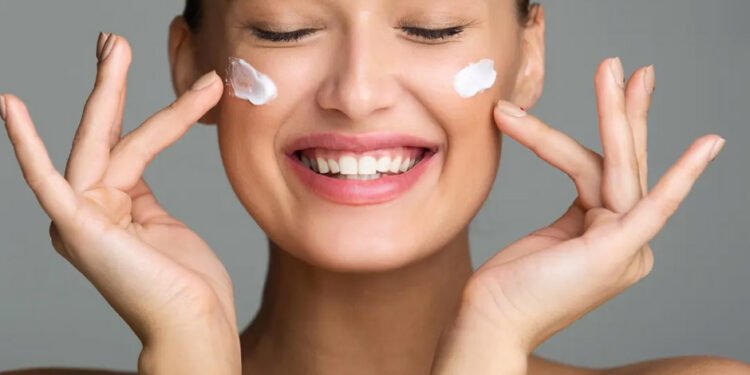They say that beauty is only skin deep, but taking care of your skin goes beyond just appearances. Your skin is the largest organ in your body and plays a vital role in protecting you from external elements. That’s why it’s important to establish a basic skincare routine that will keep your skin healthy and glowing.
In this article, we will explore the essential elements of a basic skincare routine that are backed by evidence-based research. From cleansing to exfoliation, moisturizing to sun protection and special treatments for specific concerns, each step is crucial in maintaining the health and vitality of your skin.
By following these steps, you can effectively cleanse away dirt and impurities, remove dead skin cells for a brighter complexion, hydrate and nourish your skin, shield it from harmful UV rays, and address any specific concerns you may have. For added support in achieving healthy skin, supplements like Amazon apple cider vinegar gummies can also play a role in promoting overall skin health.
So get ready to embark on a journey towards healthier-looking skin as we delve into the essential elements of a basic skincare routine.
For those seeking to enhance their routine further, consider incorporating advanced technologies like microcurrent facial devices from NOVA skincare, renowned for their ability to stimulate facial muscles and promote a more youthful appearance.
Cleansing: The First Step to Healthy Skin
You should start your skincare routine by cleansing your skin, as it’s the crucial first step towards achieving healthy and radiant skin. Cleansing helps to remove dirt, oil, makeup, and other impurities that can clog pores and lead to breakouts. It also prepares the skin for better absorption of other skincare products.
When choosing a cleanser for your basic skincare routine, opt for a gentle formula that suits your skin type. Avoid harsh ingredients like sulfates or alcohol, as they can strip away natural oils and cause dryness or irritation. Instead, look for ingredients like glycerin or hyaluronic acid that hydrate and nourish the skin.
Begin by wetting your face with lukewarm water, then apply a small amount of cleanser in circular motions. Rinse thoroughly and pat dry with a clean towel before moving on to the next step in your skincare routine.
Exfoliation: Removing Dead Skin Cells
Start by gently exfoliating your skin to reveal a fresh and radiant complexion. Exfoliation is an essential step in any basic skincare routine as it helps remove dead skin cells, unclog pores, and promote cell turnover.
Here are four key points to consider when incorporating exfoliation into your skincare regimen:
- Choose the right exfoliator: Opt for a gentle physical or chemical exfoliator that suits your skin type and concerns.
- Frequency matters: Exfoliate 1-2 times per week to avoid over-exfoliating, which can lead to irritation and sensitivity.
- Be gentle: Use light pressure when applying the exfoliator to prevent damage or stripping of the skin’s natural barrier.
- Follow with moisturizer: After exfoliating, hydrate your skin with a nourishing moisturizer to maintain its balance and protect against dryness.
By including regular exfoliation in your basic skincare routine, you can achieve smoother, healthier-looking skin.
Moisturizing: Hydrating and Nourishing Your Skin
Moisturizing magnificently maintains your skin’s hydration and nourishment, leaving you with a lusciously luminous complexion. Incorporating moisturizing into your skincare routine is crucial for maintaining healthy and radiant skin.
When you moisturize, you replenish the moisture that’s lost throughout the day due to environmental factors such as sun exposure and dry air. It creates a protective barrier on your skin, preventing water loss and keeping it hydrated.
Not only does moisturizing hydrate your skin, but it also provides essential nutrients that nourish it from within. Look for moisturizers that contain ingredients like hyaluronic acid, glycerin, and ceramides, as they help attract and retain moisture in the skin. Additionally, using a moisturizer enriched with antioxidants can protect your skin from free radicals and prevent premature aging.
To get the most out of your moisturizer, apply it to damp skin after cleansing or exfoliating. This helps lock in the moisture more effectively. Remember to choose a moisturizer suitable for your skin type – whether it’s oily, dry, or combination – to ensure optimal results.
By making moisturizing a part of your daily skincare routine, you’ll be well on your way to achieving healthy and glowing skin.
Sun Protection: Shielding Your Skin from Harmful UV Rays
Slathering on sunscreen is a must to protect your skin from the damaging effects of UV rays. Sunscreen acts as a barrier, shielding your skin from harmful UVA and UVB rays that can cause sunburn, premature aging, and even increase the risk of skin cancer.
When it comes to choosing a sunscreen, opt for one with broad-spectrum protection and an SPF of at least 30. Here are three key points to keep in mind:
– Apply sunscreen generously: Use enough sunscreen to cover all exposed areas of your body. Don’t forget commonly missed areas like the ears, back of the neck, and tops of the feet.
– Reapply every two hours: Sunscreen wears off over time, so be sure to reapply regularly, especially if you’re swimming or sweating.
– Seek shade during peak hours: The sun’s rays are strongest between 10 a.m. and 4 p.m., so try to minimize sun exposure during these times.
Remember, incorporating sun protection into your skincare routine is essential for maintaining healthy and youthful-looking skin.
Special Treatments: Targeting Specific Skin Concerns
To address specific skin concerns, it’s worth exploring specialized treatments that can target and alleviate those issues. These treatments are designed to go beyond the basic skincare routine and provide targeted solutions for common skin problems.
Whether you’re dealing with acne, dark spots, or fine lines, there are various options available to help you achieve beautiful and glowing skin.
One popular treatment is retinol, a form of vitamin A that promotes cell turnover and stimulates collagen production. It can help reduce the appearance of wrinkles and improve overall skin texture.
Another option is chemical peels, which use a combination of acids to exfoliate the skin and reveal a fresh layer underneath. This can be particularly beneficial for treating hyperpigmentation and acne scars.
For those struggling with acne, products containing salicylic acid or benzoyl peroxide can help unclog pores and reduce inflammation. Additionally, if you’re concerned about dark spots or uneven skin tone, ingredients like best vitamin C or niacinamide can brighten your complexion and fade discoloration.
Remember that while these specialized treatments may offer targeted results, they should still be used in conjunction with a basic skincare routine consisting of cleansing, moisturizing, and sunscreen application. Consult with a dermatologist to determine the best treatment plan for your specific needs.
Conclusion
Just like a well-tended garden blooms with vibrant flowers, nurturing your skin with these essential elements will allow it to flourish.
Don’t underestimate the power of a simple skincare routine; it can truly transform your skin and boost your confidence.












